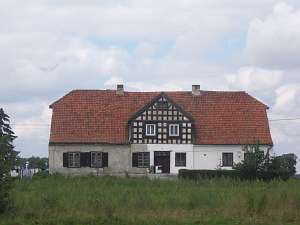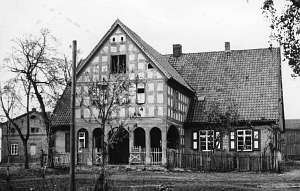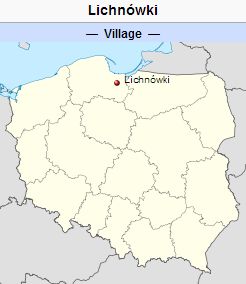Difference between revisions of "Klein Lichtenau (Pomeranian Voivodeship, Poland)"
| [checked revision] | [checked revision] |
m |
AlfRedekopp (talk | contribs) m (Text replacement - "cms/ct/" to "pages/forschungshilfen/") |
||
| Line 17: | Line 17: | ||
Wikipedia. "Lichnówki." Web. 14 December 2012. http://en.wikipedia.org/wiki/Lichn%C3%B3wki. | Wikipedia. "Lichnówki." Web. 14 December 2012. http://en.wikipedia.org/wiki/Lichn%C3%B3wki. | ||
| − | Wolf, Hans-Jürgen. "Familienforschung in Westpreußen." Web. 14 December 2012. http://www.westpreussen.de/ | + | Wolf, Hans-Jürgen. "Familienforschung in Westpreußen." Web. 14 December 2012. http://www.westpreussen.de/pages/forschungshilfen/ortsverzeichnis/details.php?ID=3172. |
= Maps = | = Maps = | ||
Latest revision as of 16:06, 23 June 2020

Source: Catalogue of Monuments of Dutch Colonization in Poland website

Source: Catalogue of Monuments of Dutch Colonization in Poland website
Klein Lichtenau (now known as Lichnówki or Lichnowy Małe; coordinates: 54.107778, 18.898333 [54° 6′ 28″ N, 18° 53′ 54″ E]; population in 1905, 477; in 2012, 400) is located approximately 2 kilometres (1 mile) south-west of Lichnowy (Groß Lichtenau), 13 km. (8 mi.) north-west of Malbork (Marienburg), and 34 km. (21 mi.) south-east of the regional capital Gdańsk (Danzig).
Klein Lichtenau was first mentioned in historical documents in 1321. In 1341, it was granted a German charter (under Kulm Law, a legal constitution for a municipal form of government) by Werner von Orseln, Grand Master of the Teutonic Order from 1324 to 1330. Klein Lichtenau's land mass totalled 71 włókas (1,275 hectares). Until 1772 Klein Lichtenau was located in what was known as Royal Prussia (also known as Polish Prussia) in the Kingdom of Poland. The First Partition of Poland in 1772 resulted in the creation of a new province in 1773, called West Prussia, in which Klein Lichtenau was located. Klein Lichtenau was situated in the district (Kreis) of Marienburg until the establishment of the Free City of Danzig in 1920. The village came under the control of Nazi Germany during World War II until February 1945, when it was occupied by Soviet forces and returned to Poland. In 2012 Klein Lichtenau (now Lichnowy Małe) was a village in the administrative district of Gmina Lichnowy, within Malbork County, Pomeranian Voivodeship.
The 1776 Prussian census lists nine Mennonite families in Klein Lichtenau with the following surnames: Barckmann, Claassen, Friesen, Mattis, Neyfeldt, Penner, and Toews. In 1820, the village had 341 residents, including 44 Mennonites.
Mennonites who were residents of Klein Lichtenau were members of the Heubuden Mennonite Church.
Bibliography
Stowarzyszenie Konserwatorów Zabytków. "Lichnowy Małe." Catalogue of Monuments of Dutch Colonization in Poland. 2005. Web. 14 December 2012. http://holland.org.pl/art.php?kat=obiekt&id=375&lang=en.
Wikipedia. "Lichnówki." Web. 14 December 2012. http://en.wikipedia.org/wiki/Lichn%C3%B3wki.
Wolf, Hans-Jürgen. "Familienforschung in Westpreußen." Web. 14 December 2012. http://www.westpreussen.de/pages/forschungshilfen/ortsverzeichnis/details.php?ID=3172.
Maps
Map:Lichnowy Małe, Pomeranian Voivodeship, Poland
| Author(s) | Richard D Thiessen |
|---|---|
| Date Published | December 2012 |
Cite This Article
MLA style
Thiessen, Richard D. "Klein Lichtenau (Pomeranian Voivodeship, Poland)." Global Anabaptist Mennonite Encyclopedia Online. December 2012. Web. 25 Nov 2024. https://gameo.org/index.php?title=Klein_Lichtenau_(Pomeranian_Voivodeship,_Poland)&oldid=168602.
APA style
Thiessen, Richard D. (December 2012). Klein Lichtenau (Pomeranian Voivodeship, Poland). Global Anabaptist Mennonite Encyclopedia Online. Retrieved 25 November 2024, from https://gameo.org/index.php?title=Klein_Lichtenau_(Pomeranian_Voivodeship,_Poland)&oldid=168602.
©1996-2024 by the Global Anabaptist Mennonite Encyclopedia Online. All rights reserved.
